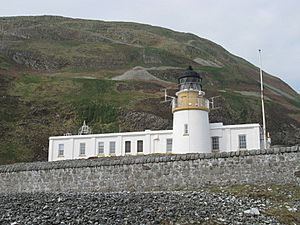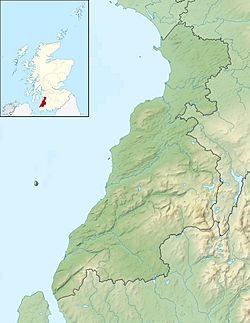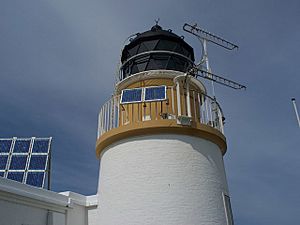Ailsa Craig Lighthouse facts for kids
 |
|
| Ailsa Craig Lighthouse | |
|
|
|
| Location | Ailsa Craig Firth of Clyde Scotland |
|---|---|
| Coordinates | 55°15′07″N 5°06′30″W / 55.251898°N 5.108413°W |
| Year first constructed | 1886 |
| Automated | 1990 |
| Construction | masonry tower |
| Tower shape | cylindrical tower with balcony and lantern attached to 1-storey keeper's house |
| Markings / pattern | white tower and lantern |
| Height | 11 metres (36 ft) |
| Focal height | 18 metres (59 ft) |
| Range | 17 nautical miles (31 km; 20 mi) |
| Characteristic | Fl W 4s. |
| Admiralty number | A4582 |
| NGA number | 4768 |
| ARLHS number | SCO-002 |
The Ailsa Craig Lighthouse is an active lighthouse built in the 1800s. It stands on Ailsa Craig, a small island in the Firth of Clyde in Scotland. This lighthouse helps ships navigate safely around the island, which is near the town of Girvan.
The Lighthouse's Story
The Ailsa Craig Lighthouse was finished in 1886. Two famous engineers, Thomas Stevenson and David Alan Stevenson, oversaw its building.
At first, the lighthouse used lamps that burned oil to create light. By 1911, these were changed to brighter electric lights.
The loud Fog signals, which warned ships in foggy weather, were stopped in 1987. In 1990, the lighthouse became automated. This means machines took over the work of the lighthouse keepers.
In 2001, the lighthouse was updated again. It was changed to run on solar power, using energy from the sun.
About Ailsa Craig Island
Ailsa Craig is sometimes called "Paddy's Mile Stone." This is because it is about halfway between the cities of Glasgow and Belfast. The island is a well-known landmark for sailors.
It is also a special place for wildlife. The island is a protected bird sanctuary. Thousands of sea birds come here to breed and raise their young.
You can also find other animals on and around the island. There is a group of grey seals living there. Sometimes, large whales are seen in the waters nearby.
During the summer, you might spot large basking sharks. These sharks are very big but harmless. They eat tiny sea creatures called plankton that grow in the water.
In June 2018, the old homes where the lighthouse keepers used to live were put up for sale. They are no longer used.
See Also



